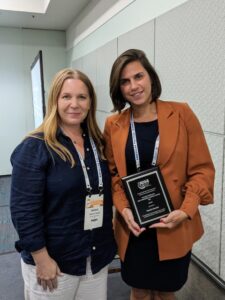
Award won:
- Walter Lippmann Best Published Paper Award
Name(s) & affiliation:
- Patrícia Rossini, Senior Lecturer in Communication, Media & Democracy in the School of Social and Political Sciences at the University of Glasgow
Project title:
- Beyond Incivility: Understanding Patterns of Uncivil and Intolerant Discourse in Online Political Talk.
Publication reference, link (APA 7th):
- Rossini, P. (2022). Beyond Incivility: Understanding Patterns of Uncivil and Intolerant Discourse in Online Political Talk. Communication Research, 49(3), 399–425. https://doi.org/10/gkfj98
Tell us something about you/your team and how and why you decided to focus on this research
- This paper summarizes the main findings of my PhD research. I originally started my PhD journey thinking about online political talk in more normative terms, aligned with scholarship in deliberation and the public sphere. Reading the literature on online political talk, though, I was surprised by the intense focus on incivility and lack of ‘respect’ as an inherently undesirable characteristic of political conversations, and realized that scholars were neglecting types of opinion expression that are more problematic in Hence, I decided to develop a content analysis scheme that disentangled tone and substance to understand the different conditions under which antinormative discourse manifests online.
In 280 characters or less, summarize the main takeaway of your project.
- My work advances a conceptual model that disentangles uncivil and intolerant online political talk, enabling scholars to disentangle discourse that is harmful from expressions that are not, and demonstrates that these two types of discourse occur under different conditions.
What made this project a “polcomm project”?
- This project considers one of the core concerns of polcomm—informal political conversations—and advances its understanding by advancing a nuanced account of how people express their political opinions online, and how antinormative political talk may be facilitated by platform affordances.
What, if anything, would you do differently, if you were to start this project again? (What was the most challenging part of this project? …& how did you overcome those challenges?)
- As with any doctoral research, there are things I would have done differently if I knew at the time. I would have tried to develop supervised machine learning models to detect uncivil and intolerant discourse at scale if I had the skills to do so back then—something that I only accomplished more recently, and in English language. I would also have expanded the platform comparisons beyond online news websites and Facebook, which I did not have the resources to do. Looking back, I am proud of what this project accomplished considering the conditions under which I developed it as a PhD student in Brazil.
What other research do you currently see being done in this field and what would you like to see more of in the future?
- There’s been a lot more work on perceptions of antinormative discourse—including, but also beyond incivility—that goes in the same direction of what I argued in this paper: people are not universally affected by incivility, and incivility alone is not enough to undermine the value of political talk. I would like to see this work on perceptions and differential effects continue to develop, as well as a consideration of how antinormative discourse affects bystanders. There’s been much less focus on more harmful online expressions—which I define as intolerant—, and I think that’s the direction for future work.
What’s next? (Follow-up projects? Completely new direction?)
- I’ve been doing many related things since this project. I followed up on this conceptual model as part of a collaborative grant funded by Twitter, which enabled me to develop algorithms to detect five subtypes of incivility and two subtypes of intolerance—which is a lot more nuanced than more common binary approaches to this task. I also have another on-going project focused on perceptions of intolerance. More broadly, my research has considered other digital threats to democracy, like misinformation and disinformation.
- Bianchi, F., HIlls, S., Rossini, P., Hovy, D., Tromble, R., & Tintarev, N. (2022). “It’s Not Just Hate”: A Multi-Dimensional Perspective on Detecting Harmful Speech Online. Proceedings of the 2022 Conference on Empirical Methods in Natural Language Processing, 8093–8099. https://aclanthology.org/2022.emnlp-main.553
Awardee Interview: Walter Lippmann Best Published Paper Award (2023)
